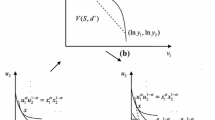Abstract
This paper studies the Nash solution to non-convex bargaining problems. Given the multiplicity of the Nash solution in this context, we refine the Nash solution by incorporating an equity consideration. The proposed refinement is defined as the composition of the Nash solution and a variant of the Kalai–Smorodinsky solution. We then present an axiomatic characterization of the new solution.
Similar content being viewed by others
Notes
Note that Conley and Wilkie (1996) propose an “equitable” Nash extension solution to nonconvex problems, which is taken as a hybrid of the Nash and the KS solutions. However, their solution is very different from ours proposed in this paper as their solution does not satisfy the efficiency criterion and is not a refinement of the Nash solution.
The KS solution can be defined as usual: for all \(A\in \Sigma \), \( F^{KS}(A)=\{x\in A\mid x_{1}/m_{1}(A)=\cdots =x_{n}/m_{n}(A),\) and there exists no \(y\in A\) such that \(y\gg x\}\). It may be noted that the solution given by \(F(A)=\{a\in A\mid \min (a_{1}/m_{1}(A),\cdots ,a_{n}/m_{n}(A))\ge \min (x_{1}/m_{1}(A),\cdots ,x_{n}/m_{n}(A)),\forall x\in A\}\) for all \(A\in \Sigma \) is a natural extension of the KS solution to nonconvex problems, as proposed by Nagahisa and Tanaka (2002). The reason that we use this variant of the KS solution (instead of the KS solution itself) is that \(F^{N}(A)\cap F^{KS}(A)=\varnothing \) for some \(A\in \Sigma \).
We are grateful to the Associate Editor for pointing this out and for suggesting the example below.
References
Conley J, Wilkie S (1991) The bargaining problem without convexity: extending the egalitarian and Kalai–Smorodinsky solutions. Econ Lett 36:365–369
Conley J, Wilkie S (1996) An extension of the Nash bargaining solution to nonconvex problems. Games Econ Behav 13:26–38
Hammond P (1976) Equity, Arrow’s conditions, and Rawls’ difference principle. Econometrica 44:793–804
Herrero MJ (1989) The Nash program: non-convex bargaining problems. J Econ Theory 49:266–277
Kalai E, Smorodinsky M (1975) Other solutions to Nash’s bargaining problem. Econometrica 43:513–518
Kaneko M (1980) An extension of the Nash bargaining problem and the Nash social welfare functions. Theor Decis 12:135–148
Lombardi M, Yoshihara N (2010) Alternative characterizations of the proportional solution for nonconvex bargaining problems with claims. Econ Lett 108:229–232
Manzini P, Mariotti M (2006) Two-stage bargaining solutions. Working paper no. 572, University of London at Queen Mary
Manzini P, Mariotti M (2007) Sequentially rationalizable choice. Am Econ Rev 97:1824–1839
Mariotti M (1998) Nash bargaining theory when the number of alternatives can be finite. Soc Choice Welf 15:413–421
Mariotti M (1999) Fair bargains: distributive justice and Nash bargaining theory. Rev Econ Stud 66:733–741
Mariotti M (2000) Maximal symmetry and the Nash solution. Soc Choice Welf 17:45–53
Nagahisa R, Tanaka M (2002) An axiomatization of the Kalai–Smorodinsky solution when the feasible sets can be finite. Soc Choice Welf 19:751–761
Nash JF (1950) The bargaining problem. Econometrica 18:155–162
Peters HJM, Vermeulen D (2012) WPO, COV and IIA bargaining solutions for non-convex bargaining problems. Int J Game Theory 41:851–884
Samuelson PA (1938) A note on the pure theory of consumer’s behavior. Economica 5(17):61–71
Samuelson PA (1947) Foundations of economic analysis. Harvard University Press, Cambridge
Sen AK (1971) Choice functions and revealed preference. Rev Econ Stud 38:307–317
Tadenuma K (2002) Efficiency first or equity first? Two principles and rationality of social choice. J Econ Theory 104:462–472
Xu Y, Yoshihara N (2006) Alternative characterizations of three bargaining solutions for nonconvex problems. Games Econ Behav 57:86–92
Xu Y, Yoshihara N (2008) The behavior of solutions to bargaining problems on the basis of solidarity. Jpn Econ Rev 57(1):86–92
Xu Y, Yoshihara N (2013) Rationality and solutions to nonconvex bargaining problems: rationalizability and Nash solutions. Math Socl Sci 66:66–70
Yoshihara N (2003) Characterizations of bargaining solutions in production economies with unequal skills. J Econ Theory 108:256–285
Zhou L (1997) The Nash bargaining theory with non-convex problems. Econometrica 65:681–686
Author information
Authors and Affiliations
Corresponding author
Additional information
Publisher's Note
Springer Nature remains neutral with regard to jurisdictional claims in published maps and institutional affiliations.
An earlier version of the paper was presented at the SEA meetings in Atlanta, Georgia, November 2010 and at the CEPET meeting in Udine, Italy, June 2011. We are grateful to M.A. Ballester, Youngsub Chun, Marco Mariotti, Hans Peters, Koichi Tadenuma, and William Thomson for helpful and encouraging comments. We are also grateful to the Associate Editor and the referee for very helpful comments on an earlier version of the paper.
Rights and permissions
About this article
Cite this article
Xu, Y., Yoshihara, N. An equitable Nash solution to nonconvex bargaining problems. Int J Game Theory 48, 769–779 (2019). https://doi.org/10.1007/s00182-019-00658-4
Accepted:
Published:
Issue Date:
DOI: https://doi.org/10.1007/s00182-019-00658-4
Keywords
- Non-convex bargaining problem
- Nash solution
- Equitable Nash solution
- Equity principle
- Binary weak axiom of revealed preference



